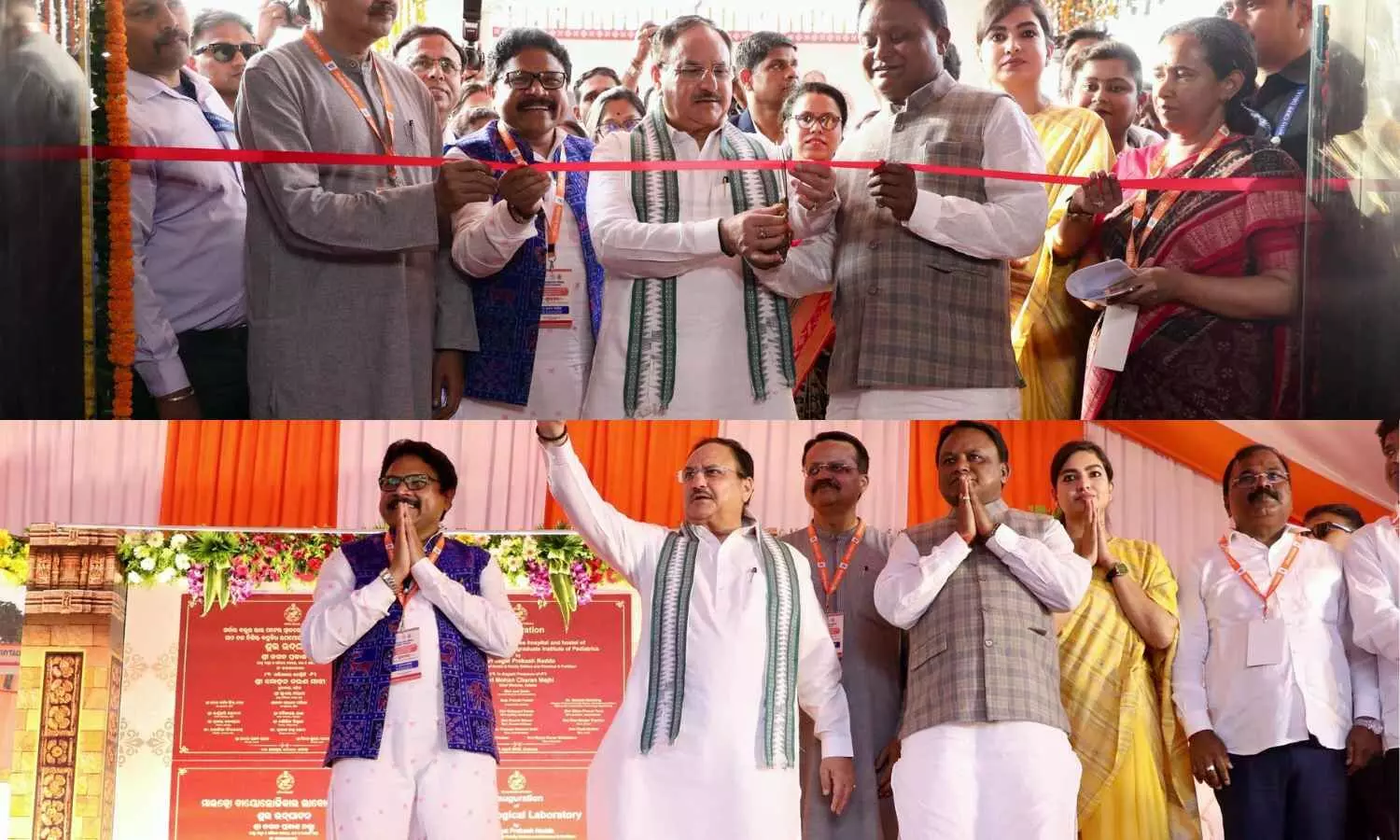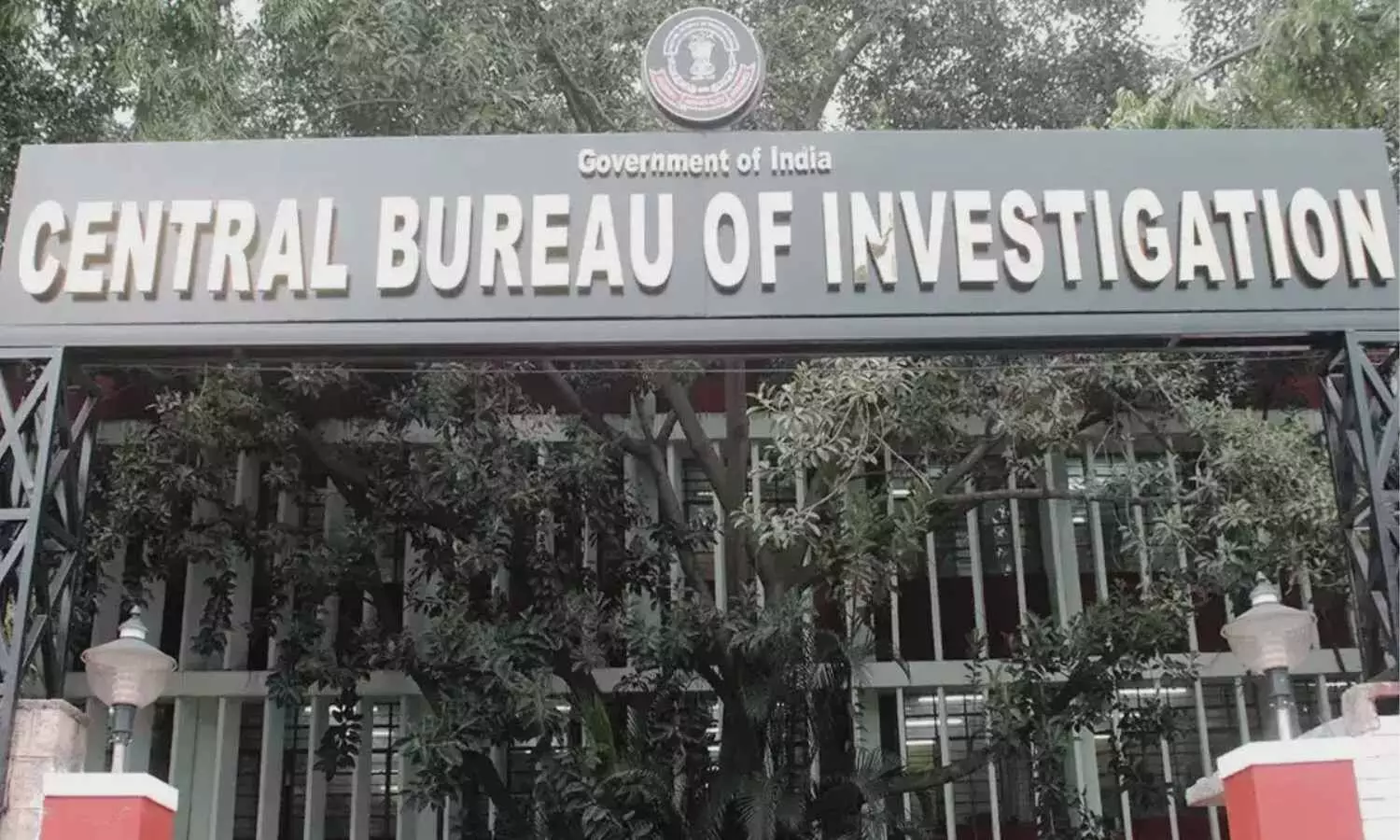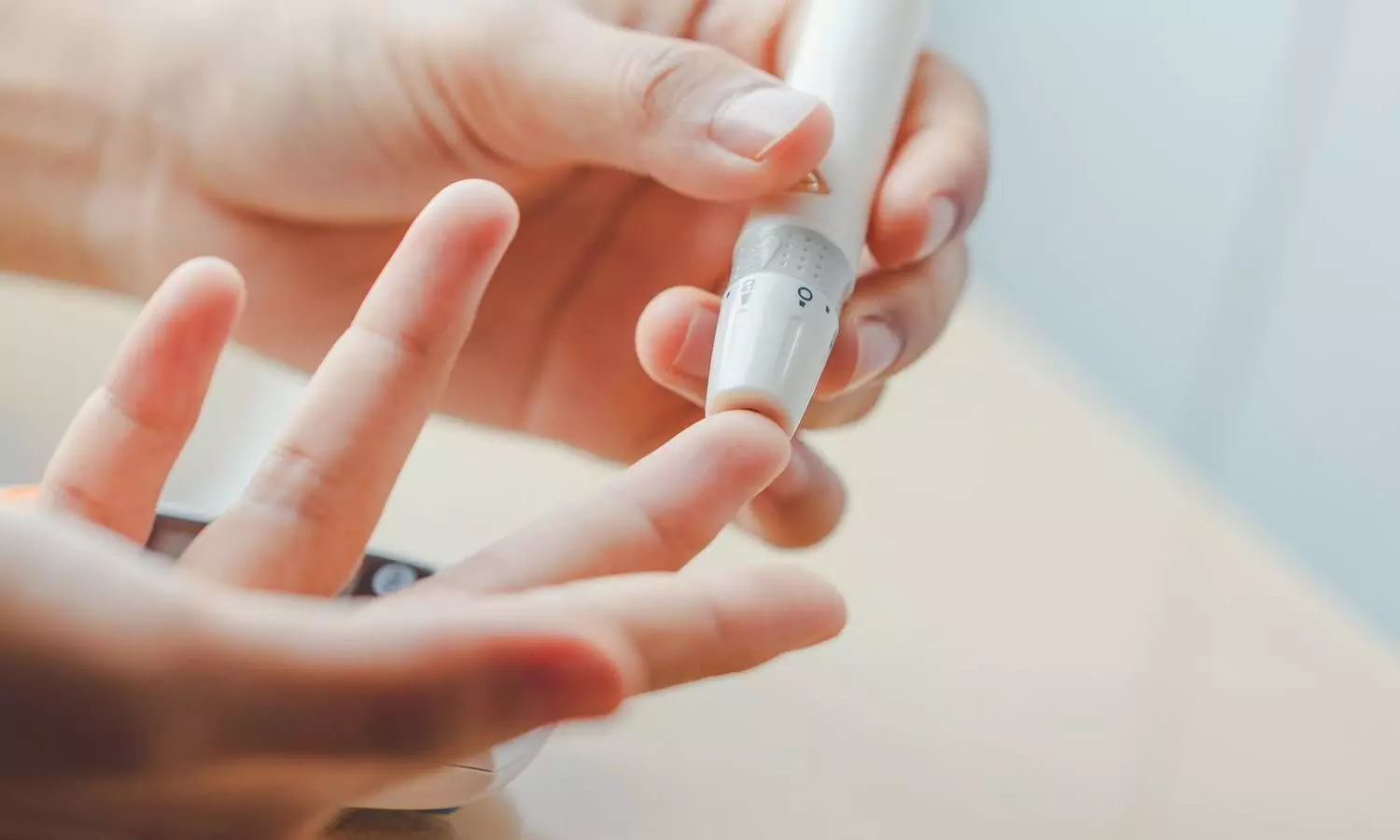Accord reached ‘in principle’ over tackling future pandemics: negotiating body
Powered by WPeMatico
Powered by WPeMatico
Powered by WPeMatico
Powered by WPeMatico
Powered by WPeMatico
Powered by WPeMatico
Powered by WPeMatico

Cuttack: Union Health Minister Shri Jagat Prakash Nadda and Shri Mohan Charan Majhi, Chief Minister, Odisha, distributed cobranded cards of Ayushman Bharat Pradhan Mantri – Jan Arogya Yojana and Gopabandhu Jan Arogya Yojana, in Cuttack yesterday.
The Ayushman Vaya Vandana Yojana was also launched during the event. Shri Jual Oram, Union Minister of Tribal Affairs; Shri Mukesh Mahaling, Minister, Health and Family Welfare, Odisha and Members of Parliament and Legislative Assembly of Odisha were also present on the occasion.
Addressing the gathering, Shri JP Nadda said that “Today is a historic day for Odisha as the AB PM-JAY, the world’s largest health coverage program under which 62 crore people are currently being benefitted, will connect approximately 1.3 crore families, almost 3.52 crore people of Odisha.”
Also Read:Union Minister Jagat Prakash Nadda visits Jan Aushadhi Kendra at AIIMS Bilaspur
Shri Nadda informed that more than 8.19 crore people have availed services under the scheme and Rs 1.26 lakh crore have been spent under the same to provide healthcare services to the people of the country.
The Union Health Minister highlighted that around 61 crore people are covered under the scheme now. He said, “earlier, more than 55 crore people were covered under the scheme.
Then ASHAs, Anganwadi workers and their families i.e. approximately 36 lakh people were added in the scheme. “In October last year, people over 70 yrs of age were covered under the scheme and now, with the implementation of Ayushman Vaya Vandana in Odisha, all senior citizens aged 70 years and above, irrespective of their socio-economic status, will be covered”, he stated.
Shri Nadda pointed out that the out-of-pocket expenditure has declined from 62% to 38% today as a result of the Ayushman Bharat scheme”. He also highlighted that under the 100-day TB Intensified Elimination Programme, Odisha proactively participated identified 16,500 new cases. “Under PM ABHIM, Rs. 1,411 crores have been provided for strengthening the healthcare infrastructure of Odisha”, he stated.
Speaking on the occasion, Shri Mohan Charan Majhi highlighted that launch event as “another feather added to Odisha’s development story”. He stated that “from today onwards, beneficiaries of Odisha will get free healthcare facility. Odia people residing outside the state will also get the benefit. They can avail the facility in the hospitals outside the state.”
He stated that under the leadership of Prime Minister Modi, Ayushman Bharat scheme is benefiting people across the nation, especially the poor and underprivileged section.
Shri Majhi informed that more than 4,000 doctors have been appointed under the current administration and 5,000 more appointments are under process. He underlined the commitment of the state government to strengthen health infrastructure in the state and stated its aim to establish medical college in all the districts of the state.
Shri Jual Oram noted that tribals of Odisha will be greatly benefited under the scheme. He stated that “people of the state are elated with the implementation of the scheme.”
Shri Mukesh Mahaling highlighted that “3.50 Cr people of the state will get health insurance cards under Ayushman Bharat & Gopabandhu Jan Arogya Yojana and 23 lakhs elderly people in Odisha will also be benefited under the Vaya Vandana Yojana.”.
Also Read:PM Modi reviews AYUSH sector, reiterates government’s commitment to strengthen it
Powered by WPeMatico

Kottayam: The use of the shortcut phrase “Repeat All” by doctors on patient prescriptions, instead of writing down each medicine name specifically, has stirred controversy, with concerns emerging over the potential misuse of certain allopathic drugs. Shockingly, it has been found that doctors used this method even on five years old prescriptions.
Government doctors often resort to writing “Repeat All” on prescriptions during hectic outpatient hours, using it as a time-saving measure. However, this practice is not particularly followed by everyone in the medical fraternity.
Doctors are naturally recommended to write the full names of medicines on prescriptions to avoid any confusion or errors at the pharmacy. The clear instruction in the prescriptions helps pharmacists from making any mistakes since any mistakes in this process could lead to a potential health risk for patients.
Also read- Homeopaths can now prescribe Allopathy Medicines in Maharashtra
Questioning why doctors follow such practices, the Kerala Health Department has issued a directive to District Medical Officers (DMOs) to review and clarify their stance on the continued use of the term, following a formal complaint by the Kerala Government Pharmacists Association.
The association highlighted the issue through a letter to the health department. It pointed out the risks involved when doctors write “Repeat All” on prescriptions without specifying the names of the medicines.
In a letter to the Director of the Health Department, the association urged the department to ask doctors not to use such practices and to follow proper prescription practices.
“Patients undergoing extreme care and those with lifestyle diseases, and those enrolled in the Community Mental Health Program are often prescribed the same medicines on a monthly basis. These patients are also provided with a booklet to record their medicines. During their monthly visits, doctors usually enquire about changes in the patient’s condition. If the answer is “no,” the doctor simply writes “Repeat All” referring to the earlier prescriptions. It is then up to the pharmacist to flip through the pages and identify the medicines to be given,” reads the letter.
The association made a shocking revelation that even prescriptions written five years ago are being repeated in this manner. The issue traces back to the COVID-19 pandemic, when many patients began collecting their regular medications directly from pharmacies without consulting a doctor or obtaining fresh prescriptions. While this was tolerated during the crisis for continuity of care, the Kerala Government Pharmacists Association claims the practice has persisted in several hospitals even after the pandemic ended.
Dr MC Tomichen, retired RMO of Kottayam Medical College, told Mathrubhumi that the correct procedure is to write the prescription clearly each and every time. He feels that prescriptions marked with “Repeat All” are vulnerable to misuse. He also said that pharmacists should remain vigilant when handling such notes.
Last month, the District Prescription Audit Committee in Pathanamthitta issued a directive to doctors urging them to avoid using ‘Repeat All’ on prescriptions to prevent the risk of giving incorrect medicines to patients
Commenting on the matter, Dr KA Sreevivas, State President of the Indian Medical Association (IMA), also insists that the full name of each medicine should be written clearly on the prescription. This helps pharmacists avoid errors or confusion when giving medicines. He acknowledges that some doctors may write “Repeat All” due to time constraints, but that not all doctors follow this shortcut.
Powered by WPeMatico

Kolkata: The Central Bureau of Investigation (CBI) has intensified its probe into the alleged rape and murder of a Postgraduate doctor trainee at RG Kar Medical College and Hospital, revisiting key individuals and officials to uncover whether there was an attempt to cover up the incident that occurred on August 9, 2024.
Medical Dialogues had previously reported that in the ongoing investigation into the tragic rape-murder of a PG doctor tarinee at RG Kar Medical College and Hospital in Kolkata last August, the Central Bureau of Investigation (CBI) informed the Calcutta High Court that medical reports had confirmed rape, but not gang rape. The agency also revealed that it was probing whether there was any attempt to cover up the incident, but conceded that it could not provide a timeline for when the investigation would be completed.
Also Read: CBI tells HC No gangrape in RG Kar case, investigating larger conspiracy
As part of their ongoing probe, CBI officers recently resumed questioning hospital officials and postgraduate trainees. On Tuesday, the team recorded a fresh statement from the security supervisor who was on duty during the night shift on August 8 — a person they had previously interviewed.
“The response time of the security personnel and that of the RG Kar administration in informing the local police station in Tala after the body was found is significant,” a senior CBI officer said, not giving further details, Telegraph India reports.
In addition to the security personnel, the CBI spoke briefly to the current principal and vice-principal of RG Kar Medical College. However, neither of them was in office at the time of the incident. The then-principal, Dr. Sandip Ghosh, remains in custody.
During the last hearing in March, the CBI counsel informed the Calcutta High Court that the agency was exploring the possibility of a larger conspiracy and was examining if efforts were made to conceal the crime or mislead the initial investigation.
Powered by WPeMatico

China: A new study has highlighted the significant impact of postoperative hyperglycemia (PHG) on clinical outcomes in patients undergoing cardiac surgery with cardiopulmonary bypass, revealing that this condition not only occurs frequently but also leads to a range of complications.
“Postoperative hyperglycemia (PHG) was observed in 65.3% of patients undergoing cardiopulmonary bypass and was significantly associated with a higher risk of several postoperative complications,” the researchers reported in Frontiers in Cardiovascular Medicine. Patients with PHG had increased rates of acute kidney injury (12.6% vs. 4.0%), delirium (9.5% vs. 3.4%), and pulmonary infections (12.0% vs. 5.1%) when compared to those without PHG.
The researchers further identified several independent risk factors for developing PHG, including pre-existing diabetes (odds ratio [OR] 13.1), pulmonary infection (OR 1.91), elevated intraoperative blood glucose levels (OR 1.51), and female sex (OR 1.38). In addition to heightened complication rates, patients with PHG also faced prolonged ICU stays and longer overall hospitalization.
Postoperative hyperglycemia is commonly observed following cardiac surgery involving cardiopulmonary bypass (CPB) and is associated with increased morbidity and mortality. Yuping Xiang, Department of Critical Care Medicine, West China Hospital, Sichuan University/West China School of Nursing, Sichuan University, Chengdu, Sichuan, China, and colleagues aimed to assess the incidence of PHG in such patients, identify its independent risk factors, and explore its impact on clinical outcomes.
For this purpose, the researchers conducted a retrospective observational study at West China Hospital of Sichuan University, analyzing patients who underwent cardiac surgery with cardiopulmonary bypass between January 2023 and March 2024. 1,008 consecutive patients admitted to the cardiac surgery ICU were categorized into PHG and non-PHG groups. Blood glucose levels were monitored immediately after surgery and every 3–4 hours daily for 10 days or until ICU discharge. Patients with PHG received intravenous insulin therapy.
Based on the study, the researchers reported the following findings:
The study revealed that postoperative hyperglycemia commonly occurs after cardiac surgery with cardiopulmonary bypass and is independently associated with risk factors like older age, female sex, diabetes, pulmonary infections, longer aortic cross-clamp time, and high intraoperative glucose levels. PHG is linked to poorer outcomes, including higher rates of kidney injury, delirium, infections, prolonged ventilation, extended ICU and hospital stays, and increased risk of self-discharge or death.
“These findings highlight the need for timely detection and effective management of PHG to enhance postoperative recovery,” the authors concluded.
Reference:
Xiang, Y., Luo, T., & Zeng, L. (2025). Risk factors and clinical outcome of postoperative hyperglycemia after cardiac surgery with cardiopulmonary bypass. Frontiers in Cardiovascular Medicine, 12, 1479922. https://doi.org/10.3389/fcvm.2025.1479922
Powered by WPeMatico
